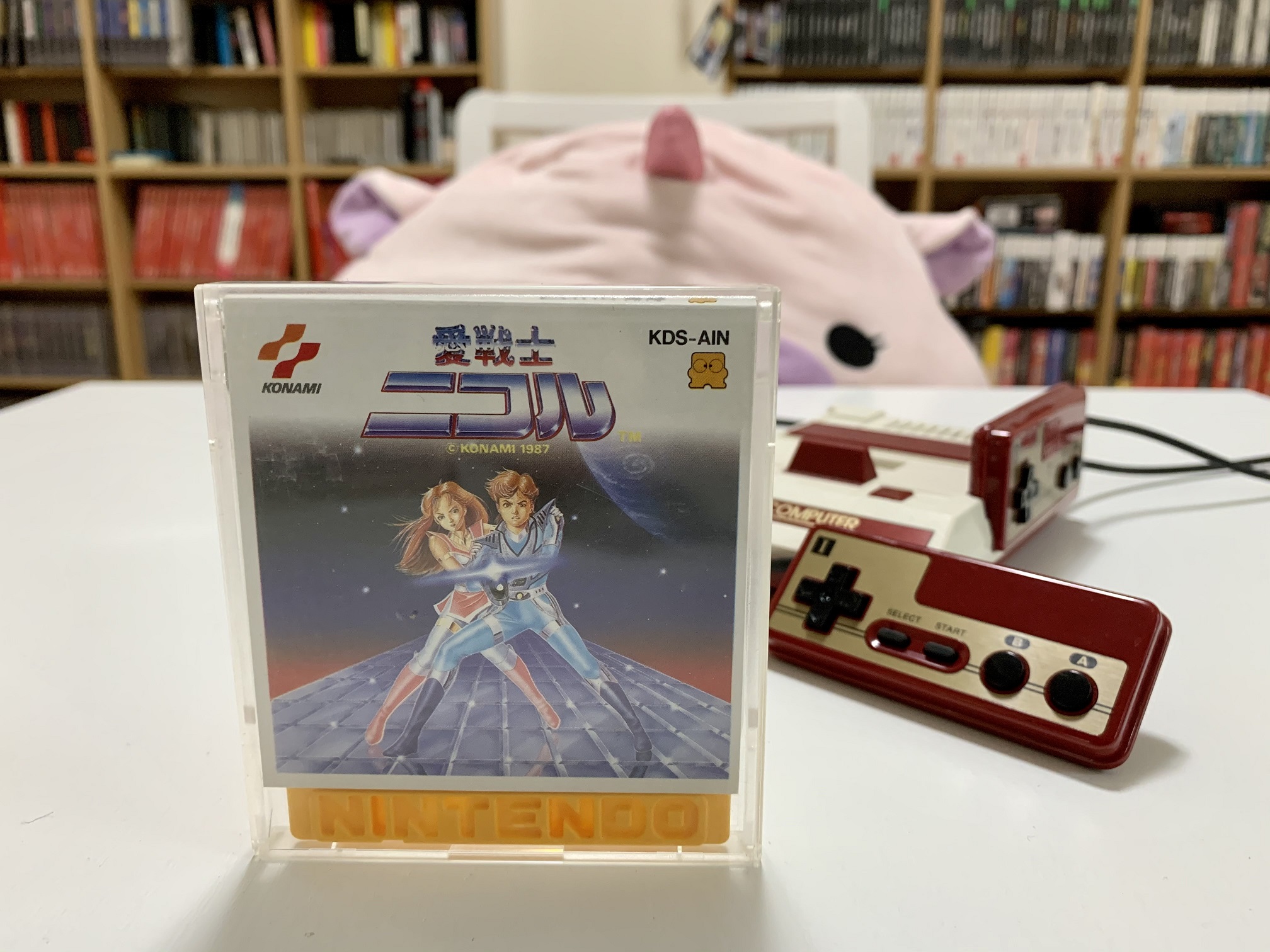Shootin’ at the walls of heartache
I have this headcanon with Ai Senshi Nicol, that it’s about a female protagonist out to rescue her girlfriend. It’s not much of a stretch. The title translates to Love Warrior Nicol (perhaps they meant Nicole, but the English text spells it Nicol). The protagonist has bright pink hair (which isn’t strictly gendered, just to be clear). They’re named Nicol. Maybe it’s an unlikely subtext for a game released before even Caper in the Castro, but a girl can dream. Sometimes I wish ’80s video games were a little gayer.

Ai Senshi Nicol is a top-down, flip-screen shooter by Konami. If you think The Guardian Legend but without the shoot-’em-up sections, I’ll have to take your word for it because it has been years since I last played it. I mostly just remember the awesome heroine who could turn into a spaceship. Maybe the top-down sections from Blaster Master are a better point of reference. The plot is that you need to save your girlfriend, whose name isn’t Nicole. It’s Stella.
Your job is to collect three crystals on each level. They’re hidden in underground sections of each stage and are largely dispersed to the far corners. To reach them, you have to do some light top-down platforming and shoot through a plethora of baddies. There’s no instant death. Even if you screw up a jump, you just fall into an underworld area and have to climb out to continue. That’s nice because death means you’re starting the stage over.

To avoid having to repeat entire stages, you’ll need to seek out power-ups. Astro Wear, Astro Pants, Power Shoes, and others. Oh, I see you’ve already got your Astro Pants on. Because your butt is out of this world.
As goofy as the nomenclature is, It’s really important to seek out this equipment. Astro Wear cuts down on the damage you’re taking, Power Shoes make you go faster, and Astro Pants prevent space lava from scalding your hyper legs. These aren’t dropped by enemies, which is fortunate, since it cuts down on the amount of grinding you might be tempted to do. Instead, they’re littered throughout the environment, giving Ai Senshi Nicol a hint of resource management. You’ll have an easier time if you stock up early and then don’t die. The Raiden or Gradius strategy.
The gameplay is extremely straightforward. The shooting, platforming, and exploration are extremely boilerplate. Even if it isn’t exceptional, it is rather tight, which is never guaranteed with 8-bit games. It’s fun, just not exactly inventive.

Where it does excel is in its variety of enemies, excellent sprite work, and musical score. It’s not exactly Journey to Silius in terms of soundtrack, but it has a few good bops. It’s Konami after all, and I can’t name one of their Famicom games that had a bad soundtrack. Hold on, I’ll try… Nope, not coming to me.
The place where Ai Senshi Nicol satisfies the most is in its secrets. Being a Famicom Disk System game, you’re able to save, but it might be best to make a habit of starting the game over. Certain power-ups are significantly better than your standard Cosmo Ball. There are hidden upgrades that increase your health and weapon. They’re used sparingly and only on certain levels, so figuring out where they are can give you a huge advantage in the game’s final stages.
Even without them, Ai Senshi Nicol doesn’t carry a deadly challenge. With a bit of patience, it’s all doable, but it’s maybe a bit more fun if you get Nicol nice and doped. There are seven levels in all, which makes the save system almost a requirement. You can probably beat it in an afternoon, just don’t make any other plans.

While not in the running for my favorite Konami Famicom discoveries, Ai Senshi Nicol is definitely worth the time, especially if you’re looking for something to slot into your Disk System. What it lacks in memorability, it makes up for by just being a quality game. Of course, you might remember it better if you adopt my gay headcanon for it.
Aside from the title screen’s logo, I don’t recall seeing even a spot of Japanese text in Ai Senshi Nicol. There’s no dialogue (aside from Oh! Mygod.) and the inventory screen is in English. A more useful translation would be for the manual, but there isn’t information there you can’t find elsewhere on the internet.
Like many Konami Famicom games, Ai Senshi Nicol was re-released once on mobile phones in 2006. However, it was never localized, even though it would have been a great fit for the 3DS Virtual Console. Konami has been releasing some surprising collections lately, so fingers crossed that we’ll see something that rounds out their early releases that don’t necessarily fit in with a longer series. Games like Ai Senshi Nicol, Getsu Fuuma Den, and Yume Penguin Monogatari. Again, a girl can dream.








